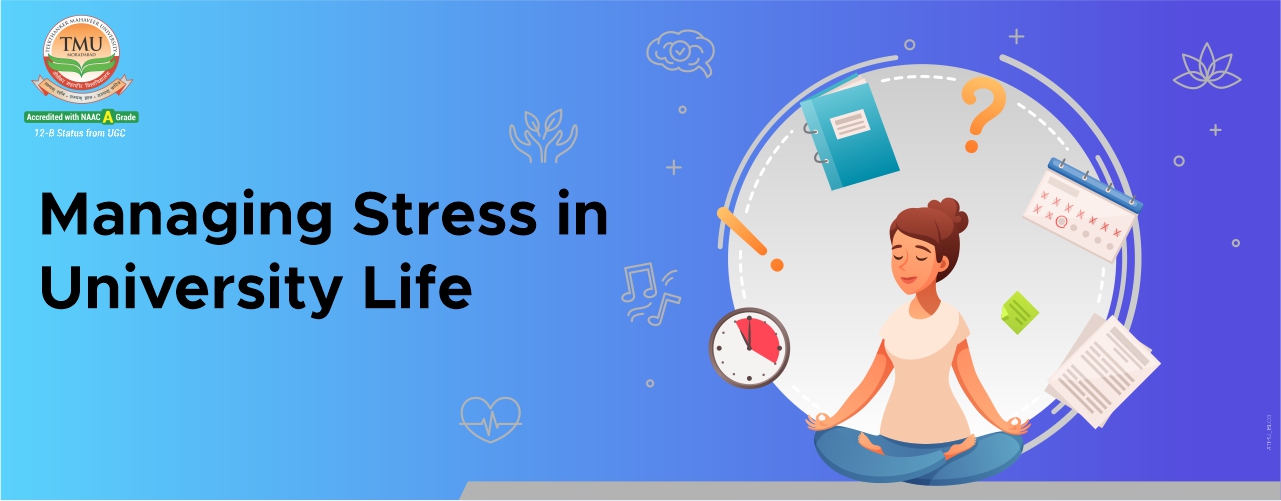Managing Stress in University Life: Tips for Students to Cope Up.
Table of Contents
In today’s world, every fragment of our society can be seen engrossed in grappling with the competitive benchmark set by the societal framework. Stress, depression, and various other mental disorders borne from the precincts of this inexorable demon of striving and thriving exert immense pressure on people, especially students. Hence, in such a dire situation, students can commonly feel overwhelmed and experience stress.
With surging stress levels and enervating anxieties, it becomes all the more crucial to know what might aggravate student stress. Hence, knowing the best possible stress management techniques and taking preventive and prophylactic measure that reduces stress is of vital essence. Let’s delve into knowing more about anomalies like stress and anxiety and what intensifies the sources of stress.
What is stress?
Often arising from challenging situations, stress is an inherent human response pushing us to address difficulties and potential threats. It's a reality for everyone, though its intensity and impact vary among individuals (quite evidently in students and the younger generation).
Mismanaging or succumbing to stress can cause severe physical and mental health problems.While manageable stress can help drive our day-to-day productivity, uncontrolled stress becomes a harbinger of numerous health complications that can assail our mental and physical states. Prolonged stress in students can undeniably wear down their mental faculties and physical health. Addressing and curbing stress is crucial to prevent feeling swamped and ensure that the overall well-being remains intact.
Stress, unchecked, can destabilize our mental and bodily systems. Although manageable stress might propel us forward, an overwhelming amount is a precursor to many health concerns. Cultivating strategies to curb stress is fundamental in sidestepping the dangerous repercussions it brings to both mind and body.
Combating stress in university life: All you need to know!
Life at university is a blend of challenges and rewards. Recognize you're part of a vast community with numerous avenues for support, all geared towards fulfilling your college experience. However, student life, while enriching, often brings with it its share of stressors, from academic pressures to the challenges of making new connections and handling financial concerns. To ensure wellness and academic success, it's pivotal to strike a balance in managing these pressures. If someone pursues an education at Teerthanker Mahaveer University (one of the top universities in India) the person will remain stress-free.
Teerthanker Mahaveer University
Apply for Admission
Click Here To Apply for Admission
Here's a roadmap to help you navigate college stress:
Prioritise Wisely
- Why It's Important: Often, students juggle numerous responsibilities, leading to feeling overwhelmed. Distinguishing between urgent tasks and those that can wait can prevent burnout, improve productivity, and nourish your mental health.
Implementation: List out tasks in order of importance. Break larger tasks into smaller, more achievable components. This approach makes tasks seem less daunting and provides a more precise roadmap for completion.
Time Management
- Why it's Important: Proper time allocation can significantly reduce last-minute stresses and improve the quality of work.
Implementation: Use tools like planners, calendars, or apps like Trello and Todoist. Allocate specific blocks of time for studying, relaxation, and other activities. Regularly review and adjust your schedule based on your progress and needs.
Recharge
- Why it's Important: Continual engagement without breaks can decrease productivity and increase mistakes.
Implementation: Set timers during study sessions, and take a 5-10 minute break every hour. Utilize these breaks to step away from your desk, do a quick physical activity, or even indulge in a short mindfulness session.
Prioritise Rest
- Why it's Important: Sleep enhances cognitive functions, memory consolidation, and overall mood.
Implementation: Aim to create a regular sleep schedule. Avoid screens an hour before bedtime, and consider relaxation techniques like reading or meditation to ensure sound sleep.
Nourish Your Body
- Why it's Important: Proper nutrition supports brain function, maintains energy levels, and improves concentration.
Implementation: Plan balanced meals with proteins, healthy fats, and whole grains. Stay hydrated. Limit consumption of caffeine and avoid heavy meals right before study sessions.
Stay Active
- Why It's Important: Physical activity boosts endorphins, natural mood lifters. It also helps in breaking the monotony of study sessions. Regular exercise can invigorate your body and bring it to equilibrium, slashing off the stress hormones like cortisol.
Implementation: Incorporate simple exercises into your daily routine. This could be a short jog, a session at the gym, or even yoga in your room.
Forge Connections
- Why it's Important: Humans are social beings. Engaging with others can provide emotional support and offer different perspectives on challenges.
Implementation: Participate in college clubs, study groups, or social gatherings. Even conversing with classmates can provide a sense of connection and belonging.
Seek Expert Guidance
- Why It's Important: Sometimes, stress can become overwhelming, and a professional perspective is invaluable. While a gazillion social stigmas latched on to seeking psychiatric counselling, the incredibility of turning to mental health resources is worth noting.
Implementation: Colleges usually have counselling services available for students. Take advantage of these resources. Mental health providers can offer coping mechanisms and relaxation techniques, and sometimes, just a listening ear can make all the difference.
Supplementing the steps above, consider these additional strategies.
Master the Art of Declining
- Why it's Important: The fear of missing out, coupled with societal pressures, often leads to a yes-man mentality. However, overcommitting can spread one thing, affecting overall well-being and performance in all tasks.
Implementation: Know your boundaries and be aware of your limits. Politely declining offers or requests that don't align with your current goals or capacities is a sign of self-awareness. You’ll be better positioned to give more in the right situations by prioritizing your well-being.
Self-Care Rituals
- Why It's Important: Regular relaxation and indulgence in activities you love can recharge your mind and offer a refreshing break from regular tasks.
Implementation:Schedule "me-time" in your daily routine. Make it non-negotiable, whether it's a 15-minute reading break, listening to a particular music playlist, or taking a stroll in nature. This not only helps in breaking the daily grind but also offers mental rejuvenation.
Embrace Calming Techniques
- Why It's Important: If left unchecked, stress can escalate and hamper mental peace. Calming techniques act as tools that ground us, keeping stress levels in check.
Implementation: Start with small sessions of deep breathing exercises, especially during moments of heightened anxiety. Dedicate a few minutes daily to meditation or yoga. These practices foster inner peace and improve overall mental health. There are many apps and online resources to guide beginners through these practices.
Lean on Support Systems
- Why it's Important: Having a solid support system provides a safety net during challenging times. Sharing feelings, venting frustrations, or simply talking can be therapeutic.
Implementation: Stay connected with close friends or family members, and ensure you have regular conversations with them, even if they are brief. Don't shy away from discussing your feelings or seeking advice. If feelings become too overwhelming, consider professional counselling or therapy. Many institutions offer these services to students, making them easily accessible.
In an era of ever-increasing societal pressures and academic demands, managing stress during university life becomes paramount. While the road ahead might seem filled with challenges, students can navigate this journey successfully and holistically with the right tools and strategies in place. It's crucial to remember that seeking help, taking breaks, and prioritizing self-care aren't signs of weakness but are indicative of self-awareness and strength. By understanding the nature of stress and actively implementing coping mechanisms, students enhance their academic experience and lay the foundation for a healthier, more balanced life in the years to come.
This content gives an overview of the programme and is for educational purposes only. For updated admission guidelines and counselling support, please connect with our Counsellor Team.














